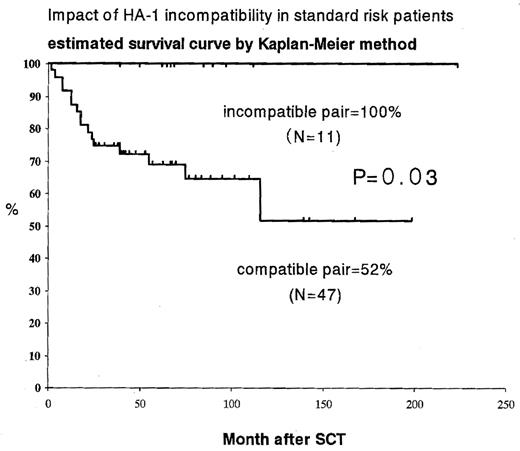Abstract
Mismatches of minor histocompatibility antigen ( mHag) between HLA identical stem cell donor and host are known as a major risk factor for graft-versus-host disease (GVHD). We determined alleles of 5 polymorphic molecules including HA-1 and 4 adhesion molecules for 107 patients stem cell transplanted from HLA identical donors and investigated the association of their mismatches with relapse rate and GVHD. All of 107 recipients received stem cell transplantation ( SCT) after myeloablative conditioning regimen from 1978 to 2002, 89 received marrow, 15 received PBSC and 3 received both. Stage of the disease at SCT was 63 in standard risk and 43 in high risk. After SCT, 37 developed acute GVHD( ≥2), 50 developed chronic GVHD and 31 relapsed during at least 2 years follow up period.
We observed 16.1% of relapse rate in patients with at least one or more incompatibilities and 39.3% of relapse rate without incompatibilities (P= 0.018). Relapse rate of patients with CD62L, HA-1, CD31 at codon 563, CD31 at codon 125 and 49b incompatibilities are as followed 6.1%, 14.3%, 11.7%, 20% and 40% respectively. No difference of acute GVHD was observed in patients with and without incompatibilities. Among standard risk patients, 11 patients with HA-1 incompatibility showed 0% of relapse rate which was better than 45% (P= 0.003) in 47 patients without HA-1 incompatibility. In addition, 10 year survival rate was 100% in the former patients which was better than 52% of survival rate (p=0.03) in the latter patients. These data suggests that polymorphic molecules of HA-1 and CD62L contribute to GVL effect rather than the developing of GVHD which resulted in long term survivor after HLA identical stem cell transplantation. Mhag analysis of donor and host in addition to HLA antigen will help a patient to find a suitable donor in HLA identical family and voluntary donor.
Author notes
Corresponding author


This feature is available to Subscribers Only
Sign In or Create an Account Close Modal